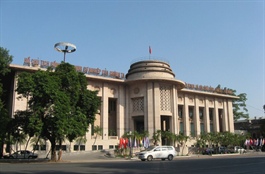Silicon Valley Bank collapse not to impact VN: VinaCapital
Silicon Valley Bank collapse not to impact VN: VinaCapital
The Silicon Valley Bank (SVB) collapse by itself will end up being neutral for Viet Nam’s stock market and economy, Michael Kokalari, chief economist at investment fund VinaCapital, has said in a report.
![]()
“Furthermore, we see no substantial risk that the dynamics which negatively impacted SVB and certain other regional US banks could significantly impact the profitability and/or solvency of banks in Viet Nam.”
It was widely reported that latent losses on SVB’s securities portfolio coupled with a drop in deposits at the bank were the main factors that led to its rapid insolvency, it said.
Vietnamese banks also held Government bonds on their balance sheets, and the prices of 10-year Vietnam Government bonds (VGBs) had dropped by around 15 per cent since mid-2021 and yields surged.
However, VGB holdings only accounted for around 6 per cent of listed banks’ total assets, and “held-to-maturity” (HTM) securities for less than 2 per cent.
This was much lower than the 5-10 per cent levels typical for US regional banks, and far below the 45 per cent for SVB.
Said differently, the rise in Vietnamese Government bond yields probably generated over US$3 billion of unrealised losses among Viet Nam’s listed banks, or equivalent to just over 5 per cent of their combined tier 1 equity; no banks stood out as being particularly exposed as having large, likely losses versus their net equity.
Also, although SVB reportedly had unrealised losses of around $15 billion on its securities portfolio (which more than wiped out its $12 billion equity), the actual catalyst for its demise was a drop in deposits that forced the bank to realise/crystalise the losses on its securities portfolio.
This dynamic was also unlikely in Viet Nam.
The drop in deposits prompted SVB to sell treasury bonds and mortgage-backed securities to raise cash to pay depositors. However, in Viet Nam the Government always ensured that depositors were made whole during past banking crises despite the fact that deposit insurance only explicitly covered $5,000 worth of losses.
“The net result of all of the above is that the risk of an SVB-style bank collapse in Viet Nam is very low, both because the catalyst that prompted the SVB situation is not present (i.e., depositors are not incentivised to withdraw their money from banks in times of crisis) and because the unrealised losses on Vietnamese banks’ securities portfolios are not large enough to significantly impact their profitability and/or solvency.”
The Silicon Valley Bank collapse was unlikely to have any significant impact on Viet Nam’s economy despite the fact that the US was Viet Nam’s biggest export market, and it had a trade surplus with the US equivalent to 20 per cent of its GDP.
“Exports to the US had already been slowing prior to the SVB collapse, and we do not believe the bank’s collapse will exacerbate that slowdown since the decline in Viet Nam’s exports to the US is primarily attributable to the fact that the inventories of major US retailers and other consumer facing firms such as Nike, etc. rose by about 20 per cent last year. Accordingly, the demand for ‘Made in Vietnam’ products was already unlikely to recover until the second half of 2023, irrespective of developments in the US banking sector.”
That said, the US government’s response to the SVB collapse prompted a plunge in interest rates and rate hike expectations, which in turn facilitated an unexpected 1 percentage point policy rate cut in Viet Nam from March 15.
A decline in US/global interest rates and a weaker US dollar would lead to an improvement in the liquidity of Vietnamese banks as well as lower interest rates in Viet Nam.
“Finally, the news that Credit Suisse is also facing severe liquidity issues – which will also be solved by Switzerland’s central bank providing liquidity to that bank – also put significant downward pressure on global interest rates.
“This will ultimately result in more liquidity flowing into the global economy, which should indirectly benefit Viet Nam’s economy and stock market.
“One of the most important reasons that we expect the Silicon Valley Bank and Credit Suisse sagas should end up being benign for Viet Nam is because both are likely to lead to a strengthening of the dong against the US dollar, which in turn will enable the State Bank of Viet Nam (SBV) to re-accumulate a significant amount of FX reserves this year.
“This would inject significant VN dong liquidity into the economy because the SBV usually accumulates FX reserves via ‘unsterilised’ interventions in the FX market, which entails an increase in a country’s monetary base.”





















